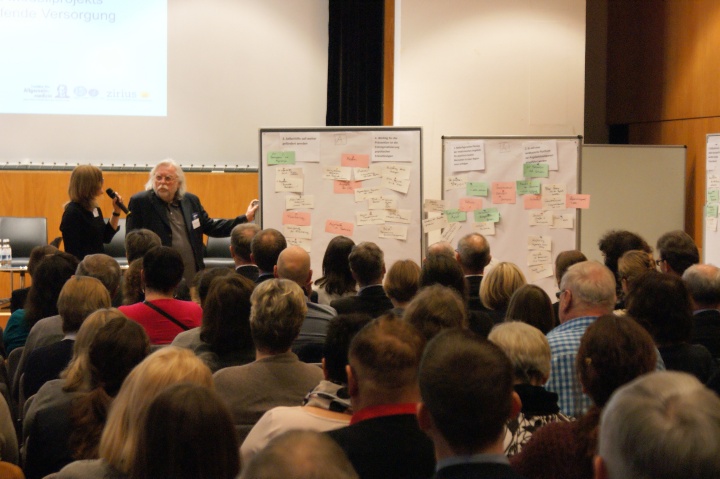For some people it promises the ability to cure or even prevent serious diseases, for others it is an ethically unjustifiable experiment to carry out on a human being. Genome editing – the deliberate modification of human genetic material – is one of the most controversial topics in modern medicine. Up until now it has mostly been discussed by experts and politicians. However, 25 internationally-renowned scientists, including Prof. André Bächtiger from the University of Stuttgart, have now called for lay citizens from around the world to be included in the debate in an article in the specialist magazine “Science”.
Designer babies and Frankenstein: these are the kind of nightmarish images which spring to mind for many people when they hear of genome editing. The reality of manipulating the DNA of an organism in such a way that the change can be passed down to the next generation is less dramatic than that, but it is highly complex. “The consequences of genome editing are so serious that the discussion shouldn’t be reserved just for doctors, scientists and politicians”, explains Prof. André Bächtiger, Head of the Department of Political Theory and Empirical Democracy Research at the University of Stuttgart’s Institute for Social Sciences and Director of the Center for Interdisciplinary Risk and Innovation Studies (ZIRIUS), who was the only German to contribute to the article. Instead, the authors propose a global citizens' assembly with 100 participants from all over the world. The idea is that this would represent the diversity of perspectives on genome editing, produce a constructive dialog, and result in recommendations on how this technology should be regulated.
An understanding of other points of view and creative recommendations
Objections to this could be made on the grounds that this kind of dialog-based format is expecting too much of the average person, especially with a topic like genome editing. Though if the citizens’ assemblies are well structured, the participants need not be overwhelmed. Participants should be provided with balanced information, have the opportunity to put questions to experts and stakeholders, and the event should be moderated in a way which ensures that all participants can contribute to the discussion. “Experiences with previous transnational citizens’ assemblies on migration policy or climate change show that these kinds of dialog-based formats can promote an understanding of other points of view and result in some creative recommendations, despite some of those taking part having some controversial positions”, reports Bächtiger. “This is still the case even when it hasn’t been possible to form a consensus between different values and points of view.” Bächtiger went on to say that members of the general public are also not subject to the same constraints of being a representative or the need to keep to a certain position, which means they can be more open to good arguments and other perspectives.
Resonating with international organizations and the public worldwide
The researchers hope that a global citizens' assembly on genome editing won’t just lead to constructive discussions between participants, but that it will also resonate with international organizations such as the World Health Organization (WHO) and the Food and Agriculture Organization of the United Nations (FAO), as well as among the general public worldwide. The way to achieve this is through intensive media coverage and documentation of the proceedings.
Analysis is to be performed in the new ZIRIUS Participation and Deliberation Lab
The new ZIRIUS Participation and Deliberation Lab at the University of Stuttgart, a platform for innovative research into political communication, reflection and citizen participation led by Prof. Bächtiger, will perform content analysis of the quality of the discussion as well as its effect on the global citizens' assembly. This will be done with the help of new computer linguistic technology. This technology is currently being researched and tested as part of the “Optimum Communication. Experimental Research in Combination with Simulation and Computer Linguistics” project within the Terra Incognita program at the University of Stuttgart. Those involved in the project include Prof. André Bächtiger (Head), Prof. Sebastian Pado and Prof. Jonas Kuhn (Institute for Natural Language Processing (IMS), Prof. Raphael Heiberger (Institute for Social Sciences/ Department of Computational Social Science) as well as Prof. Gregor Betz (KIT). The scientists are aiming to systematize the research into the quality of the discussions and its effects on forming opinion, and at the same time develop new and promising formats for citizens’ assemblies.
Expert Contact:
Prof. André Bächtiger, University of Stuttgart, Institute for Social Sciences, Department of Political Theory and Empirical Democracy Research, tel.: +49 (0)711/685 81450, e-mail
Original publication:
John S. Dryzek, D. Nicol, S. Niemeyer, S. Pemberton, N. Curato,
A. Bächtiger, P. Batterham, B. Bedsted, S. Burall, M. Burgess, G. Burgio, Y. Castelfranchi, H. Chneiweiss, G. Church, M. Crossley, J. de Vries,
M. Farooque, M. Hammond, B. He, R. Mendonça, J. Merchant,
A. Middleton, J. Rasko, I. Van Hoyweghen, A. Vergne (2020): Global citizen deliberation on genome editing. Global governance can be informed by a deliberative assembly composed of lay citizens.
Science. https://science.sciencemag.org/cgi/doi/10.1126/science.abb5931



